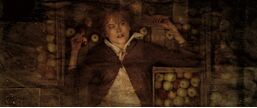Tom is working on an issue of "acceptance" among residents. And coincidentally, the arrival of Grace became the best test product for his theory.
Residents disagree about whether to take in Grace. But through Grace's two weeks of hard work, they felt that this new thing might not pose any threat to them. On the contrary, they accepted her with a kind heart. At this time, Grace saw a strange light surround every town inhabitant.
However, when everyone knows that Grace is a wanted criminal and realizes that she is giving alms, they become hypocritical preachers. Everyone thinks that their favors should be rewarded higher and begins to make more and more unreasonable demands on Grace, and even use her as a dog in exchange for her body, thinking that they deserve it.
But Grace didn't realize that her escape (escape from the gangster family and forces) was essentially escaping from the "evil" in her own nature. She came to Dogtown wearing the mask of an angel, wishful thinking that she had come from the cage of evil to the Eden of the uncontested good, and the "good" will be rewarded by the "good". When spring and summer have passed and the first snow of autumn arrives, she sees in despair that anything pure and crystal clear is just silently and powerlessly accepted by the town, and eventually exhausted, and the town is still small. The town will not be changed because of a snow, it will only become colder because of a snow, revealing its true colors.
Grace's conversation with her father in the car is perhaps the essence of the story. She has never been a god or an angel, and the so-called influence and mission are self-deception. At first, she was still persistently reluctant to return to the cage of evil that she had agreed upon, insisting on proving her "goodness" with her forbearance and endurance, so as to gain a unique sense of superiority in the world. In the sleazy "dog nature" of the residents of Dogtown, Grace, who has a beautiful appearance and an equally beautiful heart, should really feel superior to realize her pride as a "human". However, when she resolutely stepped out of the car and wanted to return to this town, she looked around, and saw the people who had been with her for months, everyone who had been ill-conceived but now trembling with obscenity, she suddenly realized She is no different from them: if she were in the same situation, she would do the same things as they did. This made her feel worse than the inhuman torture and abuse she suffered in the small town, because the aura of humanity she had created for herself was gone, and her superiority and pride were smashed like Werther smashed her ten little glass men Gotta smash. The halo she had seen a few months ago came again, but she knew it was the halo of evil. She knew even more that she could never go back to Dogtown again.
In the end, she decided to set fire to the town and kill everyone. In the last tears of kindness, she shot and killed Tom, who once loved but betrayed her. Yes, when Tom realizes that his humanity has been exposed by Grace, his love immediately turns into shame and fear, and he chooses to betray her in order to fulfill his "moral perfection"; similarly, when Grace realizes the goodness that she pretends to be. The wings had been shattered, and she had become unforgiving of the town. They are a test paper of humanity for each other and self, but they are so fragile.
Before the shooting, Tom's words became the core of the whole film:
"I thought I was a successful experimenter, but now I know that you are."
Day and night surrounded by black and white curtains, some lines The planned town, a few tables, chairs, and houses built with beds, a dozen physical people and a non-physical dog... This simple stage tells us that the story itself is also a test paper for humanity. Not many things, however, stand the test, as sharp and fragile as the last few shots of the film and a flash of fire.
The physical man disappeared, and the incorporeal dog revived its own entity in a bark.
View more about Dogville reviews











